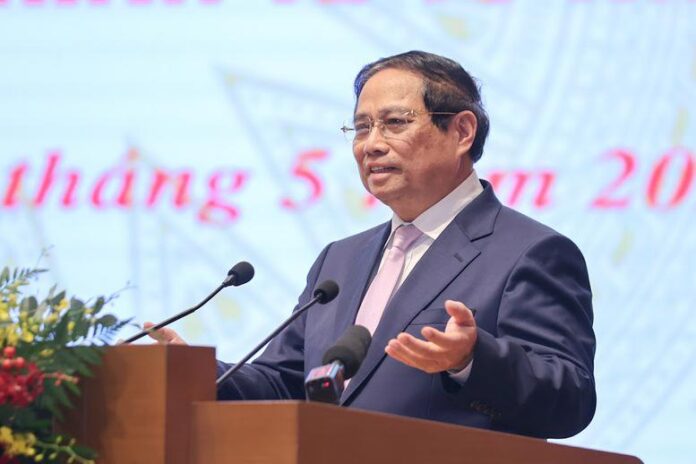On the morning of May 31st, at the Government Headquarters, Prime Minister Pham Minh Chinh hosted a seminar with businesses and business associations to effectively implement Resolution 68-NQ/TW of the Politburo on private economic development.
The seminar was held in a hybrid format, with in-person attendance and virtual connections to the headquarters of the People’s Committees of provinces and centrally-run cities. It was attended by the Deputy Prime Ministers, ministers, and leaders of ministries, sectors, agencies, and over 1,000 delegates representing businesses, business associations, business households, and cooperatives. The event aimed to gather contributions and suggestions on policies, tasks, and solutions for private economic development in the coming time.
To institutionalize the policies mentioned in Resolution 68-NQ/TW of the Politburo, just 11 days later, the Government promptly submitted to the National Assembly for the issuance of Resolution 198/2025/NQ-QH15 on special mechanisms and policies for private economic development. Subsequently, the Government issued Resolution 138/NQ-CP and Resolution 139/NQ-CP on the action plan to deploy the Resolutions of the Politburo and the National Assembly.
At the seminar, Decision No. 1055/QD-TTg dated May 30, 2025, of the Prime Minister on the establishment of the National Steering Committee for the implementation of Resolution 68-NQ/TW of the Politburo was announced.
After listening to the reports and concluding remarks, Prime Minister Pham Minh Chinh highly appreciated the determination of the delegates to turn the Resolutions of the Party and the State into concrete products and measurable results. He emphasized the spirit of “saying and doing” and fulfilling commitments.
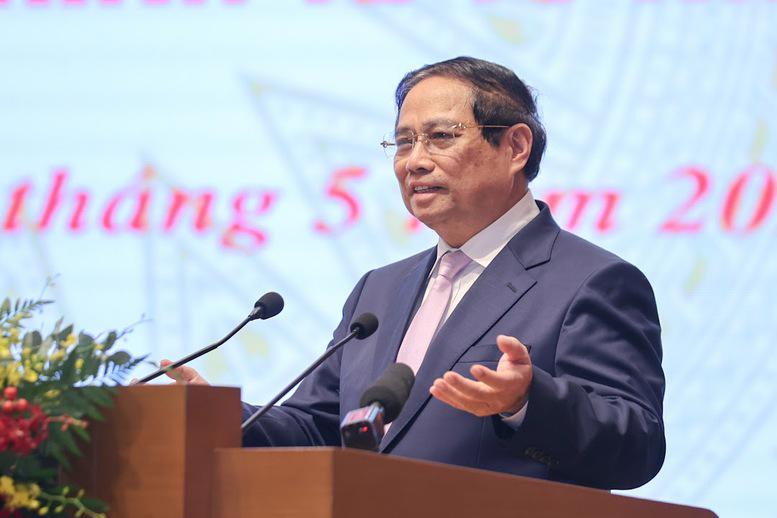
The Prime Minister summarized the discussions into six main points.
First, all delegates and businesses demonstrated strong patriotism and a desire to contribute to the country’s rapid and sustainable development. They are ready to take on tasks assigned by the Party and the State, and legal fears have been alleviated.
Second, businesses and entrepreneurs want to affirm their position, role, and importance in implementing Resolution 68 of the Politburo and the Resolutions of the National Assembly and the Government. They expressed optimism and confidence, contributing to the Government’s efforts in creating development.
Third, businesses and entrepreneurs will actively contribute to realizing the Party and State’s two strategic goals for the next 100 years (by 2030, becoming an industrialized country with modern industry and upper-middle income, and by 2045, becoming a developed country with high income). They are determined and confident that with effective strategies and organization, Vietnam can achieve GDP growth of 8% this year and maintain double-digit growth in the following years.
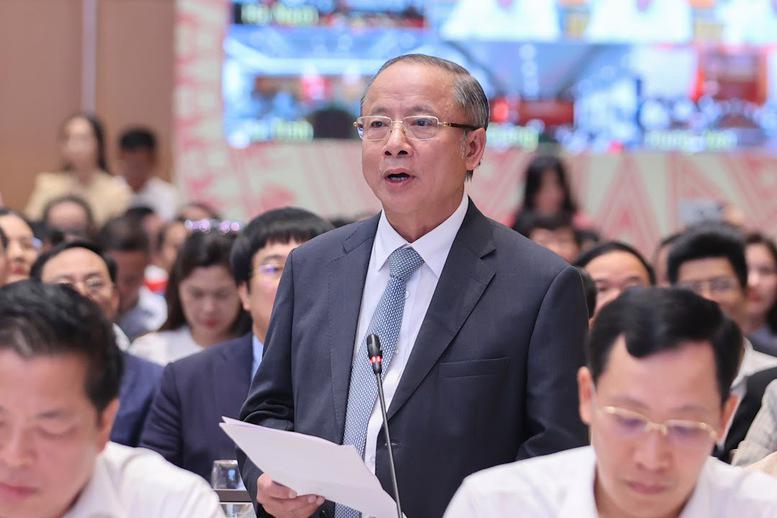
Fourth, businesses and entrepreneurs hope for more trust and higher-level tasks from the Party, State, and people. They want to be assigned more noble and challenging tasks to demonstrate their pioneering role in serving the country’s rapid and sustainable development and to foster their growth and advancement.
Fifth, businesses and entrepreneurs wish for a reduction in cumbersome administrative procedures and timely processing of their proposals, with clear timelines instead of prolonged uncertainty.
Sixth, they called for specific and clear mechanisms and policies to prioritize development in important fields and major tasks of the country. There is a need to further concretize policies to assure businesses and enable them to access national resources such as capital, minerals, human resources, and other necessary conditions on an equal basis.
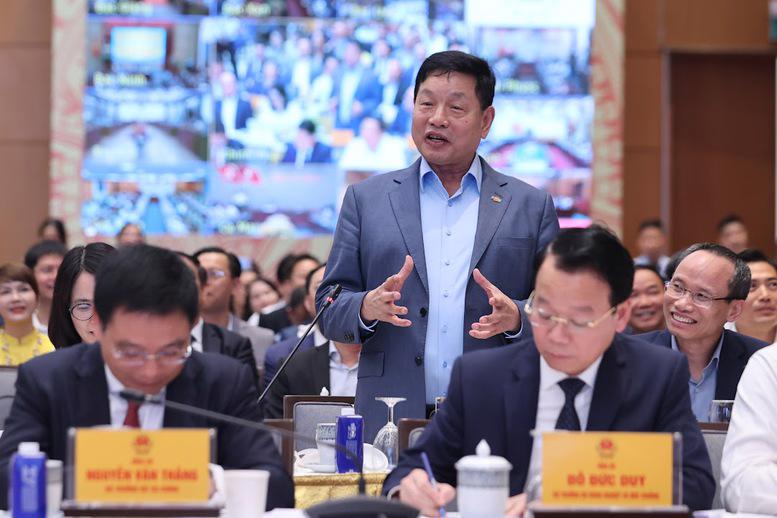
Regarding the responsibilities of the Government, ministries, sectors, and local authorities, the Prime Minister proposed seven groups of tasks and solutions.
First, the Government, ministries, sectors, and local authorities should fulfill their role as a builder and facilitator, refraining from involving themselves in specific business matters. Their key tasks include developing strategies, plans, and policies to promote private economic development; designing tools for monitoring and supervision, focusing on post-inspection instead of pre-inspection; evaluating and drawing lessons from practical experiences; organizing competitions and awarding outstanding businesses and entrepreneurs, recognizing that “the market is a battlefield” and “entrepreneurs are warriors”; and promptly handling violations without affecting the honor and reputation of entrepreneurs and businesses. The Prime Minister expressed his readiness to honor outstanding entrepreneurs as heroes and bestow other worthy titles.
Second, the Government, ministries, sectors, and local authorities should focus on improving the three strategic breakthroughs: institutions, infrastructure, and human resources. They should promote decentralization and delegation of power, reduce administrative procedures, and cut the time, costs, and effort required for compliance by citizens and businesses. Developing infrastructure is crucial to creating new development spaces, including new urban, industrial, and service areas, increasing land value, reducing input costs, and enhancing the competitiveness of products. Additionally, there is a need to invest in human resource development to meet the demands of businesses.
Third, the Government, ministries, sectors, and local authorities must ensure the independence, sovereignty, and political stability of the country, including cyber security, to provide a conducive environment for businesses to thrive sustainably. The Prime Minister emphasized that rapid and sustainable development cannot be achieved without a stable, independent, and free country.
Fourth, the Party, State, and relevant agencies must ensure equal access to capital, resources, land, human resources, legal rights, and freedom of business for all enterprises.
Fifth, the Prime Minister requested regular meetings with businesses to address their concerns and find solutions. The Government and the Prime Minister have been proactive in engaging with businesses, meeting at least three times since the beginning of 2025 to discuss the formulation of Resolution 68, address difficulties, and respond to emerging policy issues. Suggesting quarterly meetings, the Prime Minister also directed ministries, sectors, and local authorities to follow suit and meet regularly with businesses to resolve issues within their management domains. He emphasized the importance of utilizing the recently launched National Legal Portal.
The Prime Minister particularly requested that all proposals and difficulties faced by businesses be resolved within two weeks. He stressed the need for transparency, stating, “If it’s a yes or no, say it. If it’s in progress, communicate it. Don’t keep it internal and leave businesses hanging.”
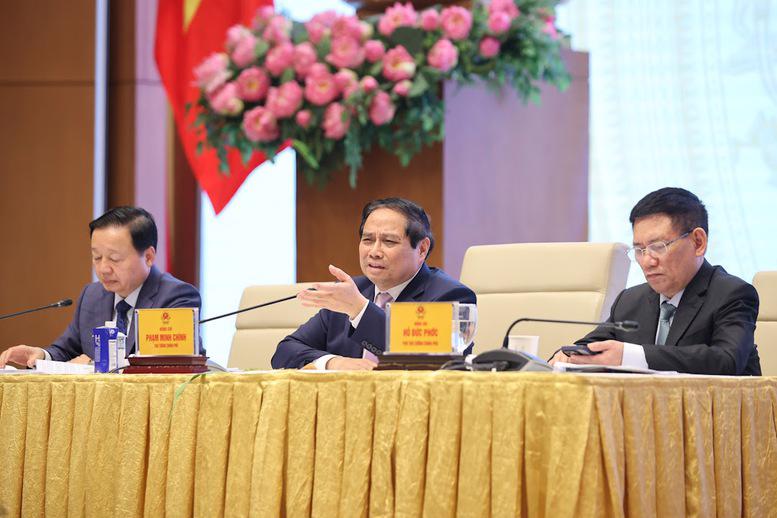
Sixth, regarding proposals and initiatives that require state management and law-making, ministries, sectors, and agencies should listen and fully accept them. If there are any objections, they must provide justifications and explanations.
Seventh, the State Bank and the Ministry of Finance, along with other ministries and sectors closely related to business activities, such as the Ministry of Construction and the Ministry of Agriculture and Environment, should regularly review policies in areas such as monetary, fiscal, raw materials, and construction.
Regarding monetary policy, the Prime Minister requested the banking sector to share and support businesses, understanding that the development of businesses is linked to the development of the banking industry.
On fiscal policy, the Prime Minister suggested that tax, fee, and charge policies should be timely, flexible, and effective. He drew an analogy, saying, “When a person is mildly ill, treatment is simple, but if the illness becomes severe, it requires more time, more medication, longer hospitalization, and higher costs.”
At the seminar, the Prime Minister directed the Government Office to issue a document requesting ministries to review, report, and propose to the National Assembly for amendments to land-related issues this year. This could be done through revisions to the Land Law or the issuance of a resolution to address the concerns at the upcoming 10th session.
“If enterprises have proposals, they must be resolved within two weeks. But we also need to be proactive and constantly innovate, considering what businesses need and what they are facing difficulties with, and actively resolving them,” the Prime Minister emphasized.
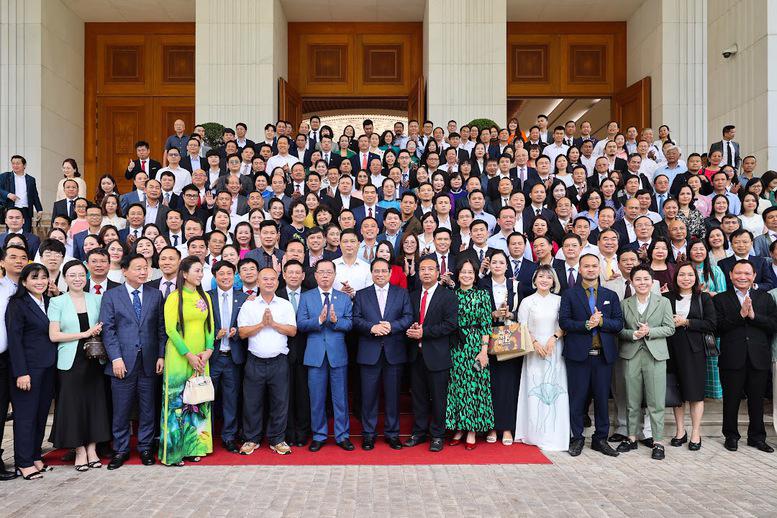
Regarding expectations, trust, and hopes for businesses and entrepreneurs, the Prime Minister proposed six points.
First, businesses and entrepreneurs should operate within the framework of the law and uphold business ethics and civic responsibilities.
Second, they should continuously innovate, research, and apply science and technology, focusing on digital transformation and smart governance. They should take the lead in technology transfer, especially core and source technology, for the benefit of the nation.
Third, private enterprises should foster stronger cooperation, connection, and mutual support with each other, with FDI enterprises, and with state-owned enterprises to create broader supply chains, production chains, and service chains with a national and global reach.
Fourth, business households should transform into enterprises, small and medium-sized enterprises should grow into large enterprises, and large enterprises should aspire to become global and multinational enterprises with global supply chains.
Fifth, businesses and entrepreneurs should actively contribute to ensuring progress, equality, and social welfare. They should ensure equal access for all citizens to essential areas of concern, such as infrastructure, education, healthcare, electricity, and connectivity. Additionally, they should actively engage in social housing development and the eradication of temporary and dilapidated houses nationwide.
Sixth, businesses and entrepreneurs should join the Government, ministries, and sectors under the leadership of the Party and the management of the State in building and protecting the country toward “stable and sustainable development, sustainable development, and sustainable future,” aiming for the happiness and prosperity of the people.
Regarding the proposals made by businesses at the seminar, the leaders of several ministries and sectors provided immediate feedback. The Prime Minister assigned the Government Office to synthesize and the ministries to continue responding to the enterprises’ recommendations.
The Powerhouse Province: Commanding 100,000 Billion VND in Project Investments with Just 0.6% of Vietnam’s Land Area and 1% of Its Population
This province boasts immense potential for the development of marine-based industries. With its strategic location and abundant natural resources, it serves as a prime hub for fostering a robust blue economy. The region’s untapped maritime prospects present exciting opportunities for sustainable growth and prosperity.
Unveiling NCB Bank’s Latest Pride: The “Pride” Card Series, a Sequel to the Acclaimed “Unity” Visa
The Visa Thong Nhat card is more than just a financial product; it is a symbol and a personal statement of patriotism and national pride in this new era of global integration. With the success of the Thong Nhat card, NCB is proud to unveil its plans for a new line of cards that celebrate love for one’s homeland, aptly named the “Pride” collection.
The Golden Opportunity: Unlocking the Next Chapter for the Gold Market
“By opening up imports of raw gold and breaking the SJC’s monopoly, the domestic and global gold price differential could be reduced to just 1-2 million VND per tael.”

